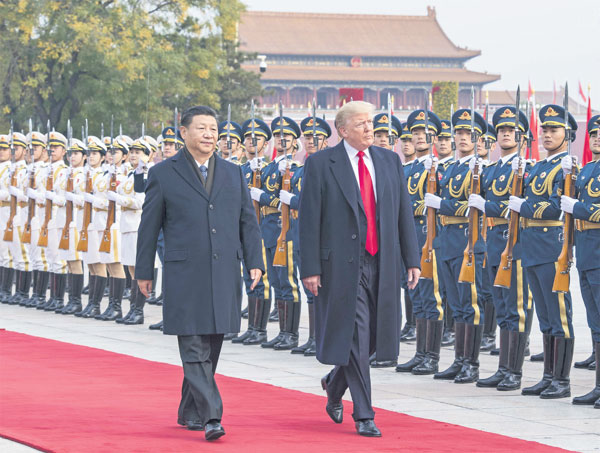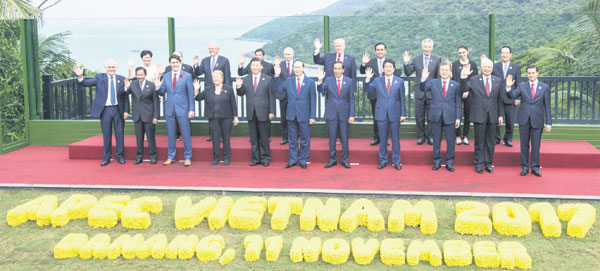Benefits for all

Fresh from historic meeting with Trump, Xi calls for more open, inclusive and balanced global economy
President Xi Jinping has stressed that the global economy needs to be "more open" in order to drive future economic growth.
The president made the remark in a wide-ranging speech delivered to the APEC CEO Summit in Da Nang, Vietnam, on Nov 10.
"In pursuing economic globalization, we should make it more open, more inclusive, more balanced, more equitable and beneficial to all," he said.
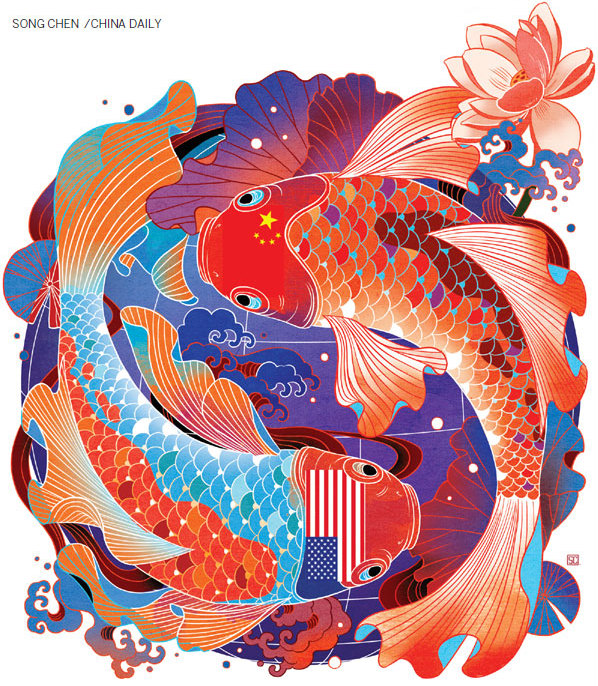
| President Xi Jinping holds a grand ceremony to welcome US President Donald Trump at the square outside the East Gate of the Great Hall of the People in Beijing on Nov 9. Li Tao / Xinhua |
The speech came after the conclusion of what was described as "a state visit-plus" to China by US President Donald Trump and what was seen as one of the most significant visits by any occupant of the White House in recent years.
It resulted in the unprecedented signing of deals worth $253.5 billion (215.2 billion euros; £192.4 billion) between the United States and China.
These included an $83.7 billion investment by China Energy Investment Corp in shale gas development and chemical manufacturing in the US state of West Virginia and a $37 billion commitment by China to buy 300 jets from Boeing, including 260 737s and 40 wide-body 787s and 777s.
Xi's address in Da Nang, which received prolonged applause, was his first major speech since he delivered his 3 hour and 23 minute report to the 19th National Congress of the Communist Party of China on Oct 18.
It also developed some of the themes from his address to the World Economic Forum meeting at Davos in January, which was regarded across the world as a robust defense of globalization.
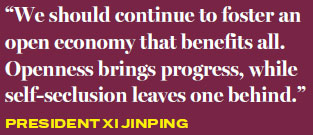
Xi said China remained committed to further opening up its economy, with next year marking the 40th anniversary of Deng Xiaoping's reform and opening-up.
"We should continue to foster an open economy that benefits all. Openness brings progress, while self-seclusion leaves one behind," he said.
"China will not slow its steps in opening up itself."
Xi made his remarks as the Chinese government announced it would give foreign financial companies greater access to financial services markets.
It is raising the limit on foreign ownership in joint ventures in the futures, securities and funds sector to 51 percent from 49 percent.
In the industrial sector, tariffs on imported automobiles will also be reduced.
Xi also reiterated the importance of China's Belt and Road Initiative, which was launched in 2013, as a driver of global economic growth.
"This initiative is from China, but it belongs to the world. It is rooted in history, but it is orientated to the future."
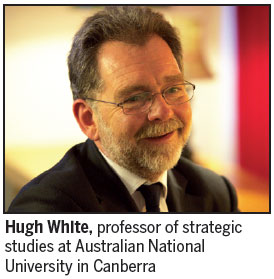
The president also stressed that China was the main driver of global growth. Over the past four years, he said, its GDP had grown by 7.2 percent annually on average, contributing more than 30 percent to global economic growth.
He also told the business leaders attending the forum that over the next 15 years, it is estimated that China will import $24 trillion worth of goods, attract $2 trillion of inbound direct investment and make outbound investment worth $2 trillion.
The economic and trade relationship between China and the US was high on the agenda during Trump's state visit.
The US leader was treated to a lavish welcoming ceremony on Nov 9, during which US military music was performed, and for which 10 US students formed part of the welcoming party.
He and first lady Melania Trump also visited a display of traditional Chinese musical instruments on display at the Great Hall of the People.
The meeting between the two leaders and their top advisers extended beyond the scheduled one hour.
Xi said in his opening remarks at the meeting that Sino-US relations were now "at a new historic starting point" and that cooperation is now "the only correct choice" for the two countries.
Trump said the warm reception he had received from the Chinese was "absolutely terrific".
"There can be no more important subject than China-US relations," he said.
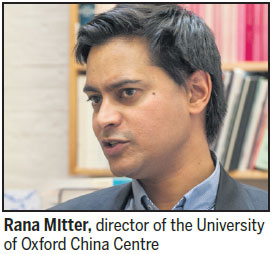
The US president also spoke of his warm personal relationship with his Chinese counterpart. It was their third face-to-face meeting following the first in April at Trump's Mar-a-Lago resort in Florida and the second in Hamburg, Germany, during the G20 summit in July.
"My feeling toward you is an incredibly warm one - as we said, there is great chemistry," Trump told his host.
More details have since emerged of the business deals agreed upon between the US and China as a result of the visit.
China's Vice-Minister of Commerce Yu Jianhua said on Nov 13 that the deals could exceed the $253.5 billion already signed.
He said these could involve major contracts in the chemicals and energy sector that may take months or even years to complete.
"These commercial contracts involve trade and investment projects, with some needing to be implemented immediately and some settled via long-term talks," he said.
Xie Tao, professor of political science at the School of English and International Studies at Beijing Foreign Studies University, told a roundtable event on Nov 10 in Beijing organized by the Center for China and Globalization, a leading independent think tank, that the value of the contracts was extraordinary.
"It is an amazing figure. If you study the list of the agreements, you will find that China-US trade relations have changed from buying each other's goods and services to one based around investment," he said.
"For the United States, China's investment can create more jobs, and for China, the US is now a destination for its capital."
Shou Huisheng, a researcher at the National Strategy Institute at Tsinghua University, speaking at the same event, agreed that a new pattern was emerging in the nature of the commercial relationship between the US and China.
"It is becoming a trend for Chinese capital to invest in the US, which is actually a win-win outcome for both sides. For sound bilateral relations, China and the US need to study more what could foster the economic development of each other."
Wei Jianguo, China's former vice-minister of commerce and now vice-president of the China Center for International Economic Exchanges, a Beijing-based think tank, says the relationship is moving to a more complex economic and commercial relationship between the two countries.
"Apart from bilateral trade, China-US cooperation will be further expanded to investment, trade in services, cross border e-commerce and outsourcing sectors," he says.
"All these will enable the two countries' trade to move from a singletrack to a multitrack pattern."
Xi's emphasis on an open world economy at the APEC leaders meeting again prompted a debate about China's firm commitment to globalization.
Hugh White, professor of strategic studies at Australian National University in Canberra and a former adviser to former Australian prime minister Bob Hawke, says China's approach to globalization is distinct from that of the United States.
"The Americans say that if you change your rules and have stricter labor standards, we will let you export your stuff to the United States. The Chinese say they are going to build a great big railway line which will help you export your stuff to China," he says.
"Which one would you rather have? Is it rules or a railway line? One works for lawyers and the other for engineers, but which is now looking more attractive? I think we know the answer to that."
Paul Cheng, the veteran Hong Kong businessman and author of On Equal Terms: Redefining China's Relationship with America and the West, says China's view of globalization now has to be taken very seriously by everyone.
"People in the West don't yet grasp the scale of China. It is unbelievable. Not only is it soon going to be the biggest economy in the world, but by 2030 it could well be the leading innovator in the technological revolution," he says.
"The Chinese consumer is at the forefront of all of this also. There are tens of thousands of people joining the middle class in China every single day. I remember people talked about American tourists going abroad and the Japanese in the 1980s. That was nothing."
The state visit by Trump was seen as one of the most significant since then US president Richard Nixon's famous meeting with Chairman Mao Zedong in 1972, which heralded China's opening-up to the West.
CNN, the global news channel, described the two-day visit as "the most consequential foreign visit of Trump's presidency".
Trump and his wife were also afforded a rare private tour of the Forbidden City, the ancient imperial palace, that included a performance by Peking Opera students.
David Shambaugh, professor of political science at The George Washington University, says this was very important symbolism and reflected the positive personal chemistry between the two leaders.
"It is a very important heritage for Chinese civilization and very important that President Trump on his first visit to Beijing be shown this 5,000 years of history," he says.
"That I am sure will have a big impact on him and his wife."
James Heimowitz, president of the New York-based China Institute, the education and cultural organization, who also advised the Chinese government on the Beijing Olympics when he was Asia president of communications giant Hill and Knowlton, believes Trump and Xi have a big common ground.
"They are heads of state that represent what the people want, so I think it all starts at a human level, a people-to-people level," he says.
Many experts believe the state visit could prove key in resetting the relationship between the US and China.
Rana Mitter, director of the University of Oxford China Centre and author of China's War with Japan, 1937-45: The Struggle for Survival, agrees it was an important visit.
"It was more in the wider spectrum of visits aimed at resetting the relationship between the two countries and a new way forward. There was an atmosphere of friendliness, if tentative, but it was quite genuine because it is not clear which way it is going to go."
Andrew Wedeman, director of the China Studies Initiative at Georgia State University, says the United States needs to move away from thinking it somehow can contain China.
"I don't think there would be any particular rationale for trying to block China's rise. The United States obviously has to come to better understand the goals and objectives of China and, you know, at a summit like this, President Trump certainly could move to a greater understanding of what President Xi Jinping's vision of a global power is," he says.
Xi also emphasized his support for regional trading blocs in Asia at the APEC meeting.
He said China remained committed to the setting up of the Free Trade Area of the Asia Pacific, which is APEC's blueprint trading area for the 21 members of the organization.
He also said he would push for the early completion of negotiations concerning the Regional Comprehensive Economic Partnership, which would be a free trade agreement involving the 10 ASEAN members and the six nations that have existing free trade agreements with ASEAN.
This is seen as an alternative to the Trans Pacific Partnership, or TPP, which is now in doubt because of Trump's decision shortly after assuming office to withdraw the United States from it.
White, the Australian professor who also is author of The China Choice: Why America Should Share Power, an examination of the foreign policy issues in the Asia-Pacific region, says, however, that whatever the trade bloc configurations are in the Asia-Pacific region, China will be the most important economic player.
"China is going to be the biggest game in town. Even with the more modest rates of growth we are seeing at the moment, China will remain the principal source of economic opportunity in Asia, " he says.
"I am not sure how important free trade areas like TPP really are. I have friends who know a lot about trade and they say they only have significance in the margins."
Raymund Chao, chairman of professional services company PwC in the Asia-Pacific and China, welcomes Xi's commitment to the region at the APEC forum.
"I am impressed by China's increasingly significant role on the international stage, particularly in digging out new economic drivers for regional and global economic development. China will play a bigger role in shaping the world's future agenda."
An Baijie, Zhang Yunbi, Zhong Nan, Zhao Huanxin and Su Qiang contributed to this story.
| Leaders and representatives pose for a group photo during the APEC Economic Leaders' Meeting in Da Nang, Vietnam, on Nov 11. World leaders and senior business figures gathered for the annual meeting of the 21-member APEC. Li Tao / Xinhua |
(China Daily Africa Weekly 11/17/2017 page1)
Today's Top News
- Global medical minds unleash hospital innovation trends
- Xi holds phone talks with Vietnam's top leader To Lam
- Chinese, Sri Lankan presidents hold talks in Beijing
- Xi's article on further deepening reform comprehensively to be published
- China-UK dialogue outcomes will enable them to reboot relationship
- Stellar Olympic performances spark craze for emerging sports
















